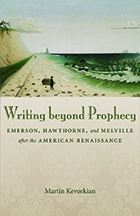
272 pages / 5.50 x 8.50 inches / 2 halftones, 2 charts
Literary Criticism | Literary Criticism / American
Writing beyond Prophecy offers a new interpretation of the American Renaissance by drawing attention to a cluster of later, rarely studied works by Ralph Waldo Emerson, Nathaniel Hawthorne, and Herman Melville. Identifying a line of writing from Emerson’s Conduct of Life to Hawthorne’s posthumously published Elixir of Life manuscript to Melville’s Clarel: A Poem and Pilgrimage in the Holy Land, Martin Kevorkian demonstrates how these authors wrestled with their vocational calling.
“Writing beyond Prophecy makes a valuable contribution to our understanding of these three canonical writers precisely because Kevorkian is willfully, and always intelligently, outside the mainstream of recent scholarship. His excellent notes are marked by thorough and informative asides that place his readings of the texts in critical context, and his bibliography and index will be useful to students and scholars interested in the critical tradition that has read these authors as deeply religious thinkers. In placing the late Emerson, Hawthorne, and Melville alongside one another in a shared religious landscape, Kevorkian crafts a readable and informative narrative.”—Nathaniel Hawthorne Review
“[Writing Beyond Prophecy] indicate[s] vistas to be explored in the interrelations of literary culture and religious belief during our post-secular age. [Its] value to readers extends beyond the specific insights [it] provide[s] to a critical perspective that can formulate new questions and require new sources of evidence.”—Leviathan
“When Kevorkian turns to Hawthorne and Melville in the second and third chapters, the Hawthorne and Melville that we meet are always in a dialogue, implicit or explicit, with Emerson throughout his career. This gives Kevorkian’s volume an impressive unity and compactness.”—Studies in the Novel
“In Writing beyond Prophecy Martin Kevorkian provides an illuminating depiction of the American Renaissance encountering the Gilded Age, of romanticism colliding with modernity. Kevorkian contends that Emerson’s later period, under scholarly reassessment for some two decades, suggests a corresponding pattern of anxiety, realignment, and crisis over literary vocation for both Hawthorne and Melville. Melville’s Clarel emerges here as a telling transitional work. Writing beyond Prophecy is sure to stimulate a reassessment of the dramatically changing role of the author in nineteenth-century culture.”—David M. Robinson, author of Emerson and the Conduct of Life
“Writing beyond Prophecy is a model of elegant writing. Kevorkian demonstrates why we must understand Emerson, Hawthorne, and Melville’s literary development in terms of—rather than against—their early-career turns away from their faith traditions. Reviving Emerson’s conception of ‘holiness’ as a kind of active thinking that enables creative production, Kevorkian calls our attention to the religious nature of the inspiration that called these writers down their literary paths. He exposes successfully and without polemics the trouble with current critical approaches that wish religion would just go away.”—Jennifer Gurley, associate professor of English at Le Moyne College
“Kevorkian’s Writing beyond Prophecy is a rich, acute, and admirably contrarian reading of the late turns of Emerson, Hawthorne, and Melville toward a spiritual re-centering, focused on the recovery of the ministerial role model. In prose notable for its candor and wit, this study argues persuasively that the ‘aftermath’ of the American Renaissance was less a period of authorial decline than a ripened occasion for questioning the isolation of the post-prophetic seeker.”—Clark Davis, author of Hawthorne’s Shyness: Ethics, Politics, and the Question of Engagement
Found an Error? Tell us about it.